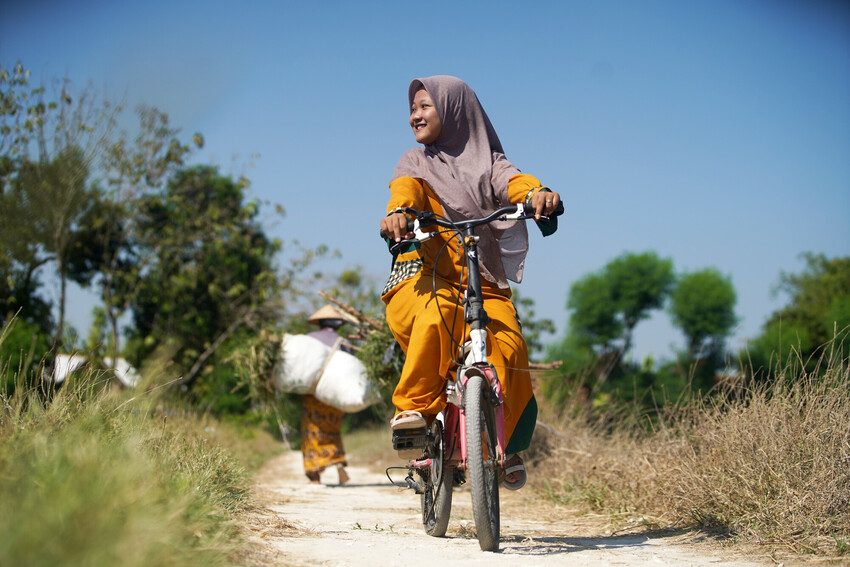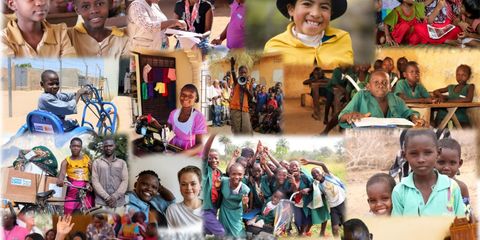Championing girls’ rights in 2021
A review of the global challenges and the achievements in Plan International’s programming and influencing work in 2021. By Raj Nooyi, Interim CEO and Gunvor Kronman, Chair, Plan International.
5 January 2022This blog relates to our Worldwide Annual Review.
Written by Plan International’s interim CEO, Raj Nooyi, and Chair, Gunvor Kronman.
In 2021*, the fourth year of our global strategy, 100 Million Reasons, Plan International supported over 26 million girls to learn, lead, decide and thrive. During this period, the COVID-19 pandemic, and the related stress it imposed on economic, educational and health systems, combined in parts of the world with climate shocks, food crises and conflict, set back progress made towards gender equality over the past decade.

Plan International’s experience has taught us that crises such as the pandemic have particular impacts for girls: on their education, their risk of rights abuses such as child marriage, their access to sexual and reproductive health services, and young women’s access to economic opportunities. COVID-19 also forced an accelerated shift to digital learning and communication, leading girls to spend more time online and exposing them to more discrimination and damaging false information than ever before.
In response, Plan International drove innovative solutions to achieve maximum impact, all while ensuring the safety and wellbeing of our staff. We had to pivot our programming and influencing approach, working with partners and young people to protect and maintain the advancement of girls’ rights both offline and online.
Adapting humanitarian and development work
As part of this shift, Plan International adapted its programmes to best deliver on its dual focus on humanitarian and development work. Given the increase in number, and intensity of stresses such as the pandemic, the climate crisis, conflict and insecurity in many regions, we had to rethink our approach to existing programmes to maintain impact in this new global context. Education programming was redesigned in response to school closures and the need for accelerated learning approaches; economic empowerment programmes encompassed food security and cash and voucher assistance; there was an increased focus on nutrition in early childhood development programmes alongside education.
COVID-19 pandemic responses
Our innovative pandemic responses ranged from supporting radio education in Ecuador; COVID-19 awareness colouring books in Egypt; and mobile community awareness caravans in Mali; to the distribution of hygiene kits including masks, gloves and sanitary pads to schoolgirls in India. The pandemic forced the entire sector to think outside the box in terms of innovative humanitarian programming and we are proud to say that Plan International delivered.
Global campaigns for girls’ rights
In addition to impact-driven programmes, Plan International also led numerous local and global campaigns in 2021 to achieve lasting change. We worked with partners, ministries of education and young activists through the #EducationShiftsPower campaign, a coordinated approach to advance girls’ education, leadership and climate justice. This work contributed to the Girls’ Education Declaration by G7 leaders, which acknowledged the importance of getting girls back to school, as well as gender-transformative education and climate education. (Calls on leaders to increase investments in education resulted in July 2021 in pledges of over $4 billion for the Global Platform for Education.) In collaboration with allies and young women, we ensured girls’ leadership and participation in the UN’s Generation Equality Forum, and launched a new Girls’ Fund to resource girl-led and girl-centred young feminist groups.
International Day of the Girl in 2021
On International Day of the Girl, the Girls Get Equal campaign launched #FreeToBeOnline. More than 66,000 people around the world – including the President of Malawi – signed an open letter written by girls to the major social media platforms calling on them to act on online violence. Instagram, Facebook and WhatsApp committed to working with Plan International on a series of listening sessions with girl activists to hear their solutions for online abuse. Plan International also carried out new research on girls’ and young women’s experiences of online harassment, surveying 14,000 girls across 22 countries about their experiences. Facebook announced steps on girls’ online safety in June, and the #FreeToBeOnline campaign continues.
Insights driving impact for girls
Girls’ voices and perspectives are central to our approach, often based on innovative research to inform our work for maximum impact. In addition to our focus on online freedom, girls’ life experiences informed research on: the Venezuelan migration crisis; innovative digital-driven solutions to end child marriage in Asia; and the impact of COVID-19 on girls and young women.
To secure impact evidence and drive innovation, Plan International has been investing in the monitoring and evaluation of our programmes and advocacy. In the past year we have developed global thematic results frameworks and indicators for use in all our programmes and projects; undertaken a large-scale project to level-up our monitoring and evaluation capacity in all offices; and deployed our first, cloud-based, global system of digital tools to collect, store, manage and report on our programmes and projects at country, regional and global levels.
Our commitment to a culture of anti-racism and inclusion
Part of Plan International’s learning and self-reflection includes our efforts to promote equality, and to listen to those we serve, and includes a commitment to build a culture of anti-racism and inclusion. In the past year, we have taken concrete actions to combat racism and all forms of discrimination in our work including:
- The creation of our Anti-Racism and Equity Council and Regional Task Forces to share insights and experience to inform our anti-racism work.
- The development of our Anti-Racism and Equity Vision and Principles through a process led by our Anti-Racism and Equity Council.
- Consultations across the organisation to develop a road map for our global approach to anti-racism.
- Expansion of dedicated workshops for our staff exploring power, privilege and bias at Plan International and in our sector.
- A review and update of the language and images used in our communications.
We know we still have ways to improve and learn in this space and recognise this is fundamental to achieving meaningful and sustainable cultural change which will, in turn, enable us to better serve young people and girls around the world.
Thanks to our staff and our supporters
We thank our staff and partners for their passion and their willingness to deal with the demands of a rapidly changing world and we are forever grateful to our supporters for their commitment to the rights of girls. With their support, in the face of unprecedented crises, difficult working contexts and multiplying risks to girls, we have been able to raise more income than ever before and adapt our ways of working to deliver on our strategic priorities.
This work to support the children and girls we stand with and serve has never been more important. We will continue to evolve how we work to achieve maximum impact and lasting change, always striving for a just world that advances children’s rights and equality for girls.
*Period covered is from 30 June 2020 to 31 July 2021.
Worldwide Annual Review 2021
This year’s Worldwide Annual Review, provides a snapshot of the scale and reach of our work from July 2020 to June 2021 in our areas of strategic focus. More information about our work can be found at plan-international.org and the websites of the member national organisations of our global federation.
Categories: About Plan International, Campaigns, Education, Emergencies, Youth empowerment


